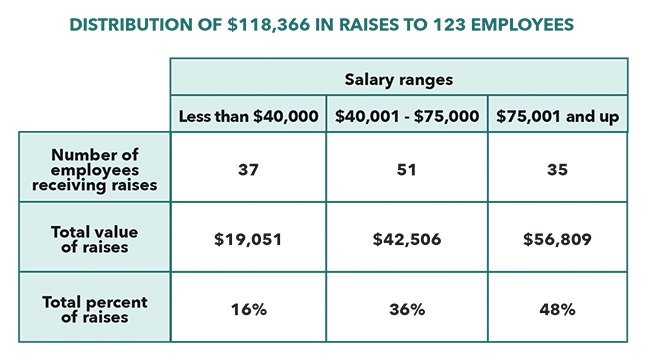As questions swirl around an ongoing FBI probe into former Buncombe County Manager Wanda Greene, some top officials are scrutinizing the results of a directive they say was meant to boost the earnings of the county’s lowest-paid employees.
For the budget year that ended June 30, county commissioners tasked Greene with giving 1.5 percent raises to the county’s lowest-paid employees. The former county manager doled out more than $100,000, with 16 percent of the money going to those making less than $40,000 and 84 percent going to those making more than $40,000. Six-figure earners captured 28 percent of all
raise dollars.
Several county staff members tell Xpress they aren’t sure how or why some employees got a pay bump while others didn’t. Emails obtained by Xpress as the result of an open records request about the budget process show that some commissioners also expressed confusion about who got raises and who did not.
Piece of the pie
Language from the budget ordinance states: “Included in the base budget is a compensation increase of 3.5 percent. Two percent of that amount shall go to all employees effective July 1, 2016. The county manager retains discretion in dispersing the remaining 1.5 percent.”
Xpress received a document outlining which county employees were tapped for the discretionary 1.5 percent pay increase. In all, 123 people split $118,366. Of those, 37 people (30 percent) getting a raise were making less than $40,000. The total amount going to those workers was $19,051 (16 percent) of all raise dollars.
In comparison, 35 employees (28 percent) who received pay increases were making $75,000 or more. In fact, 17 employees in that group were earning six figures already. Among the highest earners getting raises was Greene herself, who netted a $3,573 increase, 8.7 times higher than the smallest adjustment, bringing her salary to $241,790. Greene’s raise was the largest of all those given as part of the discretionary increase.
She also gave her son Michael Greene, whose salary was $113,743, a $1,706 raise. Michael Greene, a business intelligence manager, resigned from his position on Aug. 17, the day after Xpress broke the story about Wanda Greene being at the center of an FBI probe. The feds have confirmed they are looking at “other people,” but have not said whether Michael Greene is one of those people.
The raises for those making over $75,000 account for nearly half (48 percent) of the money commissioners say they had specified should to go to low-wage workers.

Raising questions
On May 20, Commissioner Ellen Frost asked Greene about the 1.5 percent raise via email. Frost wanted to know, specifically, “Who received that raise, how many and what position.” Greene replied, “I focused on General Service and Solid Waste for salary adjustments; however, shortly after the 2017 budget year started, we found out we were losing $600,000 in sales tax revenue. At that point we knew we needed to save this expense to cover the revenue loss and did not move on to other departments.” The email included an attachment Greene said reflected those salary changes.
The attached document, however, raised more questions than it answered. Frost wrote back: “Now I am confused. I thought it was 1.5 percent raises for lowest-paid employees. … This list does not reflect only lowest-paid employees. ” County staff told Xpress the spreadsheet forwarded to Frost was created in response to an open record request made by Asheville Citizen-Times concerning employees who had received a pay increase of more than 2 percent from the previous year, not those Greene approved for the raise in question.
Greene responded that she was “making one list work for all three requests.” Frost in turn requested a document listing only those receiving the 1.5 percent raise. On May 23, Frost again asked Greene for list. The next day, Commissioner Mike Fryar chimed in via email: “Ellen, Thank you for bringing these questions forward. … I also would appreciate the complete breakdown of all of the staff and employees that received the additional 1.5 percent salary increase.”
On May 31, Commissioner Jasmine Beach-Ferrara followed up on the issue. “I’ve been following the email threads about the pay increase for the lowest-paid county employees,” she wrote. “Can we get clarity on which employees have not yet received this and take action to retroactively compensate them for the amount owed from the past fiscal year?”
On June 1, Greene emailed commissioners a spreadsheet listing employees making less than $40,000 a year, advising: “If you want to increase those by 1.5 percent, the cost for each and in total is included. All I need is instructions to proceed if you’d like to go forward.” However, that document did not indicate whether any of the listed employees were among those those already getting the 1.5 percent pay increase.
Promoting clarity
Ultimately, the email trail reveals little if any resolution to questions posed by commissioners.
“As we looked at how those raises were distributed, I learned there substantial raises given to a lot of the higher-paid employees, which was not the intention of the county commission,” explains Commission Chair Brownie Newman. “Frankly, I was disappointed to see that. It think that was definitely not the intention of the commission.”
County Manager Mandy Stone (who was appointed on June 9 and took over the post on July 1 following Greene’s June 30 retirement) and other administrators also say they can’t figure out how and why raises were disbursed. Stone, who before taking reins of the county’s top position had headed up Health and Human Services, says she was not consulted by Greene about raises for the department’s lowest-paid employees. Further, Stone tells Xpress no HHS workers got a 1.5 percent bump. “I could not speak to that. I just wasn’t asked… I would assume we have some of the same lower pay classes other departments have,” she says. Considering employees from some departments but not others for the pay increase, Stone says, didn’t make sense: “That model is not something I could support. I think it raises inequities across departments.”
Stone garnered a 1.5 percent increase from Greene to the tune of $2,557, the second-highest amount appropriated.
Curt Euler, human resources director at the time, says, “I do not know any of the motivations. She did not go to every department,” adding that the Sheriff’s Department was also not included in discretionary raise pool.
Asked which department heads had been asked to pass along names of employees to be considered for an increase, Euler says, “The county manager did not issue any directive. There was not set policy. There was no decision points as to how to make that assessment.”
However, Newman points out that boosting lower-end salaries wasn’t a complete wash. “I do think county management went through and looked at several departments where we have a higher percentage of lower-paid employees and did do some meaningful pay raises there. So it was partially accomplished, but not as comprehensively as we’d like.”
Raising the bar
“One of the first things Mandy Stone asked me to do when becoming county manager is a pay and classification study,” says Lisa Eby, the county’s human resources and community engagement director. She says the last time the county undertook such an effort was in 2012. The study will look at pay scales in ten other urban counties, analyze the labor market in Asheville and try to better understand why people leave jobs with the county, asking, “Are there pressure points where we have high turnover, and if so could pay be part of that?” Eby says.
While there’s no firm timetable for completing the study, Eby says it’s “aggressive” and might be done in the ballpark of about four months.
In her public appearances since being tapped as county manager, Stone has been quick to discuss her brand of management as different than Greene’s. “The concept of certain people getting a raise when others don’t is something I would really struggle with,” she says. “To me, if you’re going to look at pay adjustments, it ought to be an entire management team discussion. We will use metrics, use comparisons across other big counties.”
Stone also notes that internal communications are vital to her managerial philosophy; she’s instituted weekly meetings with members of the leadership team. “Senior leadership ought to know everything I know. The truth is any one of us could be unable to come to work one day, and nobody should be the keeper of all the information.”
It remains to be seen whether those on the lowest rungs of the county’s employment ladder will benefit from an intentional pay boost, but it’s likely to be a discussion when commissioners start budget talks anew.
As for future raises at the behest of commissioners, Newman says he will be more explicit. “My takeaway, looking at the process going ahead, is that if the county wants to do things specifically to help lower-paid employees, we need to be very prescriptive in how we do that so there’s no potential for the funds to go to different places,” he says.




Before you comment
The comments section is here to provide a platform for civil dialogue on the issues we face together as a local community. Xpress is committed to offering this platform for all voices, but when the tone of the discussion gets nasty or strays off topic, we believe many people choose not to participate. Xpress editors are determined to moderate comments to ensure a constructive interchange is maintained. All comments judged not to be in keeping with the spirit of civil discourse will be removed and repeat violators will be banned. See here for our terms of service. Thank you for being part of this effort to promote respectful discussion.